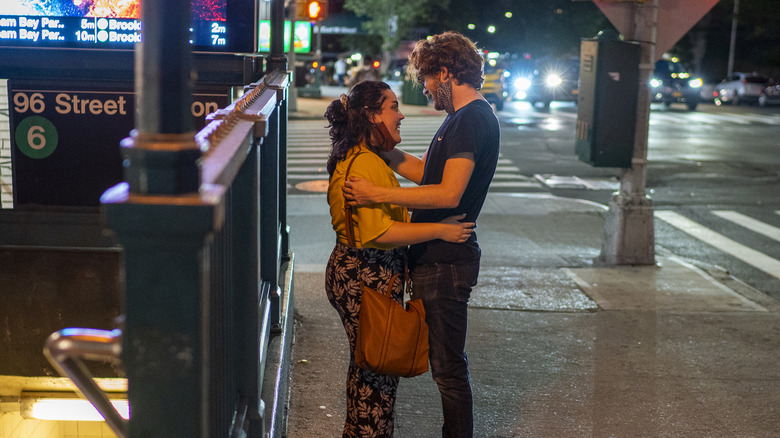Busting 3 Myths About Straight-Passing Relationships
We're here to talk about straight-passing relationships and bust some of the myths that can surface around them. For starters, a straight-passing relationship is when the relationship outwardly appears to look heteroromantic but one or both partners identifies as bisexual or queer. For instance, a bisexual man could be dating a straight woman, or a bisexual woman could be with a straight man. For our purposes here, we're specifically looking at relationships that involve the latter.
Straight-passing relationships are worth discussing because there can be a lot at stake for the queer individual. If the relationship looks heteroromantic, it runs the chance of creating queer erasure and invisibility. Many bisexual women who date men run the risk of passing as straight, and thus lose the rich texture of who they are. They can also run the risk of appearing more "privileged" than their queer peers who aren't in straight-passing partnerships. Relationships should be spaces where we're free to be exactly who we are and loved for it, so in this spirit of fully embracing the complete person, here are the three most common myths about straight-passing relationships, and why they need to be debunked, pronto!
Myth: If someone's in a straight-passing relationship, they must be closeted
One of the biggest misconceptions about straight-passing relationships is that the bisexual partner is closeted, meaning that they haven't come out to their family and friends as queer. The faulty assumption is that the queer partner has chosen their straight-passing relationship along these lines, and is using their relationship as a way to hide from their true identity.
This myth is dehumanizing for both partners in the relationship. For the queer person, it implies that their relationship hinges on dishonesty and fear to fully express themselves. For the other partner, it implies that they're being used to conceal their partner's bisexual identity. As Rachael Arsenault pointed out on Medium, bisexual people in straight-passing relationships can often be faced with the unfair task of "proving" that they're really bi. Arsenault notes that this skepticism can come from both straight and gay communities. This faulty assumption puts the individual in a liminal space, where they're not fully recognized by the queer or straight communities.
As Brittney White wrote in bi.org, people can incorrectly assume that a bisexual person in this kind of relationship experiences the "privilege" of straightness. "It makes it sound as if we're purposely pretending to be straight in order to get all the special things straight people get," White wrote. "It makes it sound as if we're somehow ashamed of our bi-ness and trying to run and hide from it. That couldn't be farther from the truth." They shouldn't have to prove their sexuality to anyone.
Myth: People in straight-passing relationships aren't accepted by the LGBTQIA+ community
A common worry about being bisexual in a straight-passing relationship is that the person will be rejected by their queer community. There's the worry of being "queer enough" and therefore missing out on, or feeling unworthy, of the familial bond with their queer family. Rachael Arsenault noted that this experience can be extremely isolating and confounding for queer individuals. Zachary Zane wrote for HuffPost about the conundrum of straight-privilege and how the misconception can create concern over which communities accept you. "Feeling confused regarding which community you belong, is not a privilege," Zane wrote.
But there are a few ways to mitigate this worry that a bisexual person will feel ostracized by their queer family if they're in a straight-presenting relationship. Mandy Shunnarah wrote in bi.org that it's imperative for the bisexual individual to stay connected to their queerness. People can do this by joining bi support groups, actively participating in Pride, and keeping close to queer friends. Niamh, a bi woman, told Refinery29 that the best way straight men can support their bisexual partners is to hold space for her queerness. "It's important to acknowledge the fact that your girlfriend is queer and that this is a part of her identity," Niamh explained. "If she wants to talk about it then you should be there to listen." It's also important for straight partners to give their bisexual partner the chance to be in queer spaces without them and to not take that personally.
Myth: Bisexual people in heterosexual relationships don't face stigma
One of the faultiest beliefs around straight-presenting relationships is the belief that bisexual women don't face struggle and stigma in these situations. Biphobia exists, particularly through many not validating the sexuality as a legitimate sexual orientation. Even worse is the fact that this doesn't always come from outside parties. Sometimes, that stigma can come from prospective romantic partners.
On top of that, bisexual women in particular are disposed to concerning risks. As the National LGBTQ Task Force reports based on a study by the CDC, bisexual women statistically have the highest risk of experiencing sexual assault, stalking, and violence from intimate partners compared to lesbian and straight women. "This report suggests that lesbians, gay men and bisexuals in this country suffer a heavy toll of sexual violence and stalking committed by an intimate partner," Dr. Tom Frieden, CDC Director, told the outlet. 61.1% of bisexual women faced these threats, as opposed to 37.3% of bisexual men. 43.8% of lesbians faced this violence while 35% of heterosexual women experienced this kind of violence. The statistics showed an urgent need for bisexual women to be included and made priorities in health research.
Being in a straight-presenting relationship comes with its own set of challenges and, unfortunately, the threat of violence at the hands of a romantic partner is a harrowing reality. It's not an easier life nor is it a privileged one and bisexual women need to feel supported and heard by the queer and straight communities alike.



